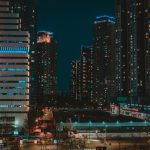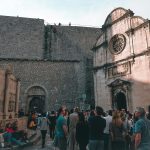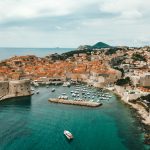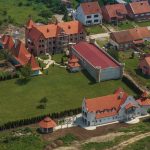August is traditionally a quiet period politically, with most of Croatia on holiday, but with a general election due on September 11, 2016, there was a little more activity than usual. An overview of the Croatian political highlights in August.
Summer Political Review
Parliamentary Elections Officially Called for 11 September
Although the month of August in Croatian politics is usually a period of ceremonial events and public holidays without much substance, this August has been quite eventful, due to the early parliamentary election to be held on 11 September. Although President Kolinda Grabar-Kitarović signed the decision on calling the election in mid-July, the decision was only published in the Official Gazette on 30 July, almost two weeks later. Such a delay had never happened before, and many analysts claimed that the President wanted to help new HDZ president Andrej Plenković by giving him more time to consolidate his position within the party and decide who will be HDZ’s candidates on its electoral lists. These will be the ninth parliamentary elections since Croatia introduced multi-party democracy. In total, 151 MPs will be elected, 140 of them in the ten regular constituencies in Croatia, three will be elected by Croatian citizens residing outside Croatia, and eight MPs will be elected as representatives of national minorities. Among the major parties, HDZ will go to the polls alone, but it will cooperate in certain constituencies with some of the smaller parties. SDP has formed the People’s Coalition, which includes HNS, HSU, and significantly HSS, a party which was earlier part of HDZ’s coalition. MOST will go to the polls without any partners, while Živi Zid has joined forces with Let’s Change Croatia party (founded by 3 MPs who left MOST) and the Franak Association. The Reformist Party and the Bandić Milan 365 Party will also go to the polls as part of a coalition. On the left side of political spectrum, the Labour Party will go to the polls alone. On the right, there are two separate coalitions, one headed by HSP AS (HDZ’s former coalition partner) and the other led by HSP.
HDZ President Plenković Invites Former Members to Rejoin the Party
One of the important decisions made by new HDZ president Plenković was to invite two prominent former HDZ members to return to the party. Former party deputy president Drago Prgomet and former candidate for HDZ president Milan Kujundžić (who was defeated by Tomislav Karamarko in 2012) returned to the party and will be candidates on HDZ’s candidate lists.
Government Ministers Attend Controversial Monument Inauguration Ceremony
The beginning of August is usually the time of heightened tensions due to anniversary of the Operation Storm which is celebrated with a national holiday on August 5 and is often accompanied by controversy. This year was no different. Everything began several days earlier when, at a town square in Drage in Zadar County, a monument to Miro Barešić was inaugurated. He was the man who in 1971 assassinated Yugoslav Ambassador in Sweden, Vladimir Rolović. At the beginning of the Homeland War, he returned from exile and in 1991 was killed in an operation in the hinterland of Biograd under still unexplained circumstances. While some consider him to be a terrorist and others a patriot, the controversy did not prevent some prominent politicians from attending the inauguration ceremony, including two government ministers, Culture Minister Zlatko Hasanbegović and Veterans’ Affairs Minister Tomo Medved. The Culture Minister was even photographed next to a flag with Ustasha symbols, and he later explained it away saying he did not realise what was depicted on the flag.
Former Leaders of Yugoslav Secret Service Found Guilty for Murder
One the more politically charged events during the summer took place in Germany, where two former leaders of the Communist secret services, Josip Perković and Zdravko Mustač, were found guilty for their role in the assassination of Croatian emigrant Stjepan Đureković in 1983. The case has long been the focus of attention of the right-wing political actors, who accused the former government led by Zoran Milanović of trying to protect the accused. Immediately prior to joining the European Union, which meant that Croatia had to begin the implementation of the European arrest warrant, the government changed the law and prevented the extradition of the suspects. However, the law was again changed in late 2013, under strong pressure from the European Union and Germany, which allowed Perković and Mustač to be extradited to Germany in the first half of 2014.
Incidents Mar August 5 Celebrations in Knin
Tensions continued on 5 August, which is celebrated as one of the most important state holidays. On this day in 1995, Croatian military and police forces entered Knin, the capital of Serb rebels, and effectively marked the victory in the Homeland War. On the other hand, the Serb side claims that Operation Storm was a planned ethnic cleansing operation which resulted in several hundred thousand local Serbs leaving the previously rebel-held areas. As always, the celebrations in Knin attracted many politicians, led by President Kolinda Grabar-Kitarović. SDP president Milanović did not come to Knin, but instead he laid a wreath at the Mirogoj Cemetery in Zagreb. Although the majority of celebrations were dignified, there were some extremist incidents. Veterans from one unit were seen marching through the city street, chanting “Za Dom Spremni!” (For Homeland Ready!) and singing various Ustasha songs. The police did not respond to these chants, and some officers of the Croatian Army in their ceremonial uniforms were reportedly seen waving to the marchers and showing them signs of support. “Za Dom Spremni” was used as a slogan during the Independent State of Croatia (1941-1945), which was a Nazi-puppet state and committed numerous atrocities. According to the law, any use of the slogan is illegal, however, police on motorcycles did not even flinch while passing next to the marchers, while some otits police officers moved a barricade in order for the group to be able to pass. In a separate incident, a Serbian flag was burnt on the street. Later that same evening, at the end of a concert by controversial singer Marko Perković Thompson, the police reported the singer for a misdemeanour because he used the “Za Dom Spremni” slogan during the concert. The incidents resulted in a series of diplomatic notes and protests exchanged between Serbian and Croatian governments which continued for much of the month.
Sinj Alka Gathers Politicians Ahead of Elections
Another important August event is the traditional Sinj Alka. In addition to being a historical and tourist festival, the Sinj Alka is also an important political event which regularly gathers many prominent politicians, who use this opportunity to promote themselves. Given that elections were just one month away, almost everybody was there this year, with an important exception again of SDP president Zoran Milanović. Unlike in Knin, no major incidents occurred in Sinj.
Milanović and Plenković Take Part in Rare Debate
Although debates between party leaders ahead of parliamentary elections are something quite usual in many countries, in Croatia there had not been such a debate for 13 years. However, both new HDZ president Andrej Plenković and SDP president Zoran Milanović accepted the invitation of the Croatian Radio Television to take part in a debate on 12 August. The debate was mostly civil and conciliatory from both sides. According to analysts, both candidates handled the debate quite well, so the overall conclusion was that the debate ended in a draw. Leaders of smaller parties protested because they had not been invited to the debate and accused HDZ and SDP of using the Croatian Radio Television to try to present themselves as the only two important parties.
Interior Minister’s Initiative to Erase “Imaginary Inhabitants” Causes Controversy
Another controversy which raised tensions between Croatia and Serbia was started in mid-August by Interior Minister Vlaho Orepić, who had launched an initiative to erase so-called imaginary inhabitants from voting registers. According to the Minister, there are about 50,000 people who are officially registered as living in Croatia, but in reality live abroad and therefore should not be able to vote in the elections and should not be taken into account when ethnic composition of certain areas is being determined. This is an especially important issue for the town of Vukovar, where Serbs currently officially make more than 30 percent of the population, which means that all signs on official government buildings should be written in both Croatian and Serbian language, as well as in Latin and Cyrillic script. This has caused numerous violent protests by some Croatian veterans’ organisations who claim that the real number of Serbs living there is much lower than the official one. “No one wants to tell the truth, but I think that already at this point, if we were to erase all imaginary residents, the Serbian minority in Vukovar would fall below the 30 percent threshold. If that is the sole basis for the use of Cyrillic script in Vukovar, after this initiative that basis will no longer exist. The Serbian minority has manipulated the situation with illegal residence registration”, said Orepić in an interview. Both Serbia and Serbian minority representatives in Croatia reacted harshly to Orepić’s statement, while the opposition pointed out that the ethnic composition is determined by census and not by voting or residence registers.
Members of State Election Commission and Constitutional Court Marred by Scandal
One of the scandals which could have long-term implications for Croatian politics is the affair concerning a member of the State Election Commission Josip Vresk and a member of the Constitutional Court Davorin Mlakar who allegedly took bribes from Hypo Alpe Adria Bank in Austria. Vresk reportedly even admitted to taking bribes. So far, both have remained at their posts.
HDZ and MOST Keep Arguing
Even though the current’s government term is coming to an end, HDZ and MOST keep arguing about which policies to pursue and which decisions to make in these final days. One of the issues in question is the new waste management plan that has been proposed by MOST’s Minister of Environmental Protection and Nature Slaven Dobrović. Although the plan was supported at internal interdepartmental meetings, it was not discussed at a cabinet meeting since HDZ had decided to withhold its support. “HDZ, which is clearly dominated by private interests, just like in the INA case, is ready to endanger national interests. They have activated all lobby groups to destroy the plan”, said Josip Katalinić (MOST). Another issue which has resurfaced just in recent days is the appointment of the director general of the Croatian Radio Television.
Number of Illegal Crossings of Border by Migrants Increases
One of the issues which defined last year’s election campaign was the refugee crisis, which hit Croatia in the autumn of 2015. Although this year the number of refugees entering Croatia has been very low, there are signs that the issue could again come to the forefront. In recent days, more and more groups of illegal immigrants have been discovered in Croatia. One such group, with about twenty migrants from Asian and African countries, was detained at the Slavonski Brod railway station and later asked for asylum in Croatia. Although the number of migrants on the so-called Balkan migrant route is substantially lower than last year, in recent weeks the pressure of migrants has been increasing. There are reports in the media that the police have started sending additional officers to the border areas, but this has been denied by the Interior Ministry.
SDP President Milanović Makes Controversial Comments during a Secretly Recorded Meeting
We end this review with the event from last week which some say could determine the results of the election. The media on Thursday published secret recordings of meeting between SDP president Zoran Milanović and representatives of the veterans’ association. The meeting took place on Tuesday morning, and the main topics were the implementation of Serbia’s law on universal jurisdiction for war crimes prosecution and the tensions between the two countries. The meeting was held at the SDP party headquarters and was opened by Milanović. “We are here to see what we can do about two issues, namely Serbia and Bosnia,“ said Milanović and added that he was ready to take even radical measures against Serbia if necessary. Milanović said that the Serbian government was acting arrogantly. “If necessary, not only are we going to block their EU accession negotiations, but we will adopt a special law which will allow us to prosecute their citizens who committed crimes in Kosovo,“ said Milanović. Milanović also spoke about the closure of the border between Croatia and Serbia which he ordered while he was Prime Minister last year during the migrant crisis. He said that he could do it again, and he again mentioned the possible suspension of Serbia’s EU negotiations. “If there is no other way, we will block them. We will not be pleased about it, but I would do it”, said Milanović. Talking about the Serbian government, he called them pathetic and told veterans not to demand a meeting with Serbian Prime Minister Aleksandar Vučić. After discussing Serbia, Milanović switched to the topic of Bosnia and Herzegovina. He said he was not thrilled with the situation there. He cited one veteran who said that it was a “big shit” and complained that there was no one he could talk to in Sarajevo. He added that he would like Bosnia and Herzegovina to enter the European Union even without all the preconditions being met, since “it is a country without law and order.“ Veterans were interested to know what Milanović thought about the “Za Dom Spremni” chant. Milanović appeared quite uninterested in the subject, saying he did not care about the issue, but did say that the chant should not be used now because it was harmful to Croatia. It is still not clear who recorded the meeting and released the recordings to the media. It remains to be seen what kind of impact the recordings will have on the campaign for parliamentary elections.







